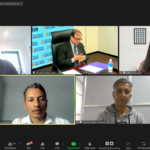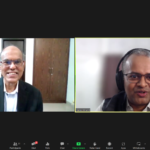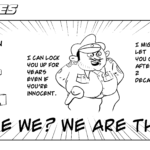Jagmeet Singh, India & Sins of Our Fathers.
1st of October 2017, saw Mr. Jagmeet Singh, a lawyer and the son of Indian Sikh immigrants from Punjab, became the leader of Canada’s New Democratic Party winning 53.6% of votes cast by his party members. His victory was heralded globally as a groundbreaking step toward inclusiveness and diversity in Canadian politics.
That’s why today, I’m officially launching my campaign to be the next Prime Minister of Canada. #LoveAndCourage
— Jagmeet Singh (@theJagmeetSingh) October 1, 2017
While Economic Times celebrated his success, some like Money Control were quick to point out that Singh was denied a visa to visit India because of his stance on the anti-Sikh riots of 1984, because while India still bills the incident as a tragedy of communal violence, Singh has vocally supported the view that it was state-sponsored.
“I have been propagating the issue that these were not riots between two communities but a state-sponsored massacre,” Jagmeet had told TOI in December 2013.
The Person:
Singh has built a reputation as a progressive force in Canadian politics, choosing “With Love and Courage” as his campaign slogan. He recently gained internet fame after a video swept social media networks, depicting him putting his slogan into practice when confronted by a racist heckler.
it is noteworthy that Singh, albeit from a very different background, has repeatedly been compared to Prime Minister Justin Trudeau. Singh too champions diversity, minority rights and an overarching sense of openness and compassion. Singh is young and hugely popular with millennials—he’s 38 and celebrated for his charismatic oratory skills, his social media savvy, and his sartorial sense.
Born in 1979, in Scarborough, Metropolitan Toronto, Singh is the oldest of four children born to Sikh immigrant parents from India’s Punjab region. He later moved to Windsor, Ontario aged seven.
Singh frequently speaks about being bullied at school for his “brown skin, long hair and funny-sounding name”. His broad agendas touch on electoral reform, reconciliation with indigenous peoples and tackling climate change. Singh supports decriminalizing personal possession of all drugs and treating it as a medical issue rather than a criminal issue. He is also passionate about scrapping the controversial practice of “carding”, which allows police to stop, question and document individuals when no particular crime has been committed.
It should be noted, that current Prime Minister Trudeau, despite being hailed as a champion of minorities, took Canada to become to second biggest arms seller to Middle East countries, especially to Saudi, which in turn is busy putting those to good use in its undeclared war against Yemen, and is also hard at work pushing for new pipelines through Canada and the US to carry yet more oil out of Alberta’s tar sands, which is one of the greatest climate disasters on the planet. Because of Mr. Singh’s history of having faced discrimination and his interest towards reconciling with the indigenous people, it can be hoped that Jagmeet will play a far more positive role on Canada and the entire world in those regards by stopping mindless violence in the Middle East by refusing to sell regimes violating of human rights weapons and making sure that natives do not have to lose their lands for oil, to begin with.
The Indian Take:
Singh had recently moved a motion in the Ontario Assembly last year to declare the 1984 anti-Sikh riots in India “genocide”. While that motion was defeated, a similar one, moved by Liberal Party lawmaker Harinder Malhi, was carried out again this April. In her speech introducing the motion, Malhi referred to and recognized Singh for the earlier motion. While speaking on the floor of the assembly during the debate on the motion, Singh had been critical of India and the Narendra Modi government. He also raised the denial of visa to him, as he said, “This is a country that continues to use visa denial as a form of silencing its critics.” While the Sikh riots broke out under the Congress government’s watch, Singh has repeatedly raised the issue of rising intolerance and attacks on minorities ever since the Narendra Modi government came to power. In 2015, ahead of Modi’s visit to Canada, Singh had urged his government to address the “escalating attacks on minority communities in India.”
He has also told the Canadian national daily, The Globe and Mail, that his supporters had informed him “that figures with links to the Indian high commission in Ottawa” were trying to use their influence to prevent members of the community from contributing to his campaign or backing him. He has made a similar statement to the Vancouver weekly, The Georgia Straight, that members of the community were “often discouraged from participating in his fundraising events”. That article said Singh noted that “some people who had earlier shown interest in donating money to his campaign later changed their minds after receiving some kind of pressure”.
In May 2017, when Prime Minister Trudeau headed to the stage at the Sikh-Canadian community’s annual Khalsa Day celebration, his appearance was the latest irritation for an Indian government reportedly worried that the Liberals are too cozy with a peaceful but “growing” Sikh-separatist movement in Canada.
Similar concerns worry India with Jagmeet. Much has been made of the fact that Singh is Canada’s first non-white federal leader, but to reduce his exceptionalism to race misses one of the most important aspects of his ascendence: his religion. Singh is the first Sikh to lead a federal party. And his unique brand of political Sikhism is central to his rise. The day after his election victory, CBC’s Terry Milewski repeatedly asked Singh to denounce Sikhs who glorify Talwinder Singh Parmar, widely considered to be the mastermind behind the 1985 Air India bombings.
Singh strongly denounced the attacks and said that though he doesn’t know who is responsible, they should be brought to justice. But avoided mentioning Parmar.
But on the other hand, most young Sikh Canadians have different concerns than Khalistani movement—namely, racial and religious discrimination in Canada and the continuing persecution of Sikhs in India. It can be argued that the current youth find inspiration in Black Lives Matter and Idle No More and not terrorist groups like Babbar Khalsa or the International Sikh Youth Federation.
Singh was asked to condemn Sikhs venerating Parmar not just because he’s a Sikh politician, but because he represents a kind of Sikh politics that Canadians like Milewski, who were enmeshed in the dramas of the Air India aftermath, are unfamiliar with. Milewski noted that Singh has long identified with the grievances of the Sikh community against India; to him and to the Indian Government, that alone, unfortunately, is cause for suspicion.
The Way Forward:
It is essential to understand that Jagmeet was denied a visa in 2013, under the erstwhile UPA regime. The anti-Sikh riots of 1984 also happened as a backlash resulting from the assassination of Congress leader and then PM Indira Gandhi. Hence Jagmeet’s opposition to the current BJP Government is not only based on his belief with respect to the wrong which has been committed against Sikhs but is also a result of the current Government’s policies and behavior.
Whether India likes it or not, the Central and State Governments of 1984 had failed in their duty to protect innocent Sikhs in the riots which left over 3,000 Sikhs dead within 48 hours. While erstwhile Prime Minister Manmohan Singh and Congress Chief Sonia Gandhi have apologized for the anti-Sikh riots before, the Indian Government has never officially apologised or accepted its failure, nor were any major instigators of the riots ever punished.
This Author believes that if not for anyone else, for the sake of our own conscience, the Indian Government (irrespective of whichever Party is in power) in specific and the Country, in general, owe an apology, to not only to the Sikh Community for the riots of 1984 in this context, but to the victims of all riots, which took place anywhere in India, post our Independence.
One should never underestimate the power of a simple, heartfelt apology. This is a chance that the Government should not let pass by, and maybe, with the apology, Canada and India can lead the world to a better future, with Love and Courage.




Leave a Reply